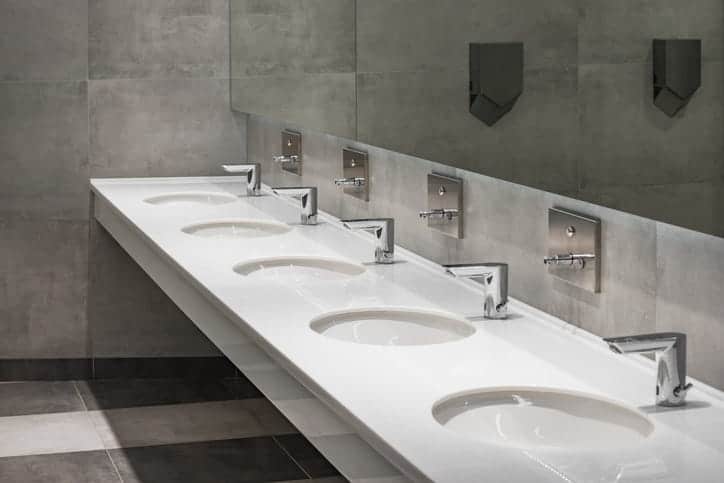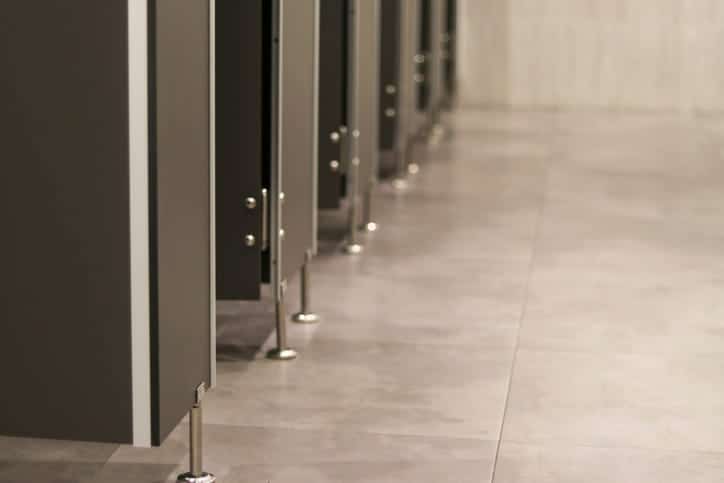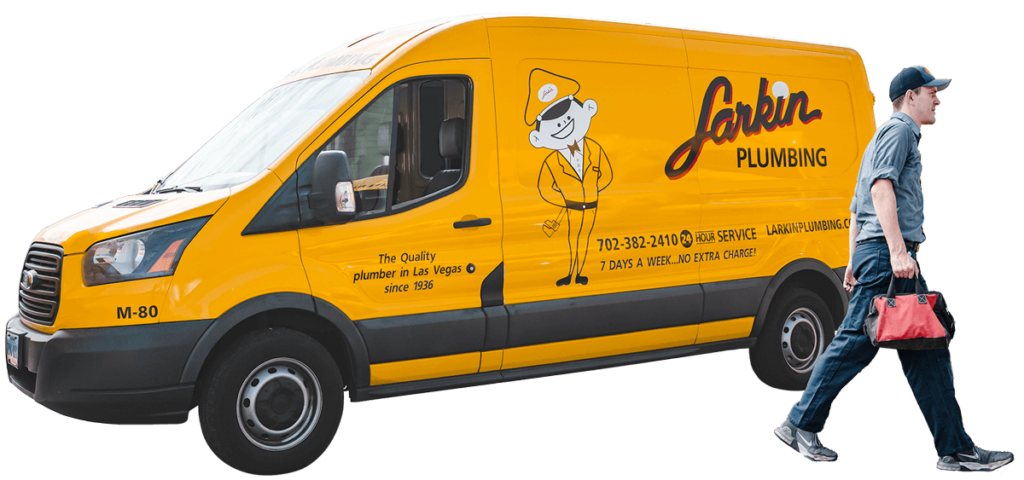
Plumbing is all around us everywhere we go. From resorts, casinos, and restaurants on the Vegas Strip to shopping centers and office complexes, all of these commercial properties rely on plumbing for fresh water, bathrooms, pools, and more. Having an experienced commercial plumber is crucial to ensure plumbing problems can be resolved quickly when they occur.
What is commercial plumbing?
Commercial plumbing is installing, repairing, and maintaining the piping systems in commercial buildings such as restaurants, hotels, casinos, office buildings, apartment complexes, and other large-scale businesses.
Need a reliable commercial plumber in Las Vegas? Call Larkin Plumbing today.
What is the difference between commercial and residential plumbing?
Commercial plumbing is different from residential plumbing as it requires more specialized skills and knowledge to handle the larger size of the systems in commercial buildings. Commercial plumbers must also be knowledgeable about local building codes and safety regulations to ensure that all installations are up to code.
Other differences between residential and commercial plumbing include:
- Types of material used: Commercial plumbing systems involve larger pipes than residential plumbing.
- Types of fixtures: Commercial plumbing often involves different types of fixtures than residential plumbing, such as specialized sinks, toilets, and showerheads designed for large-scale use.
- Maintenance frequency: Due to the size and complexity of commercial piping systems, they often need more frequent inspections and maintenance than residential systems do.
- Plumbing emergencies: Commercial plumbing emergencies require quick and efficient action due to the potential for significant damage and disruption of business operations.
- Usage of plumbing system: Commercial plumbing systems are used more often than residential ones and handle a larger volume of fresh water and wastewater.
- Multiple stories: Many commercial buildings consist of multiple stories. This requires more plumbing lines to reach all areas of the building.
- Sewer lines: Commercial buildings will have multiple sewer lines that feed into a main line. The pipes need to be larger to handle wastewater and sewage coming from multiple floors, sometimes simultaneously.
- Water pressure: Commercial plumbing systems must be designed to provide sufficient water pressure, even on higher floors. As a result, most commercial plumbing systems operate at a much higher water pressure level than residential homes.
- Water heaters: Tank-type water heaters are significantly larger in commercial settings. Alternatively, multiple tankless heaters must be installed in individual areas to provide hot water.
- Water filtration and softening systems: The scale and scope of commercial water filtration and softening systems are significantly larger to address Las Vegas’ hard water. Commercial buildings often use massive water storage tanks to ensure filtered and softened water is available whenever it is needed anywhere in the building.
What is the difference between commercial and industrial plumbing?

The main difference between commercial and industrial plumbing is the size and complexity of the systems they service. Industrial plumbing services are typically more extensive and complex, involving various pipes, fixtures, and equipment that must be installed correctly to ensure safety and efficiency. Additionally, industrial plumbing often requires additional skills, such as welding or fabrication, to complete projects.
Why does commercial plumbing require preventative maintenance?
Unlike residential plumbing, where homeowners rely more on reactive maintenance – waiting to have plumbing serviced until there is a problem – commercial properties must rely on preventative maintenance to ensure their plumbing systems remain operational at all times.
Preventative maintenance includes regular inspections, testing, cleaning, repairs, and replacement of faulty components. In addition, routine maintenance can help identify potential problems before they become too costly or dangerous.
It also helps extend the life of existing pipes and fixtures by preventing wear and corrosion. Additionally, it ensures a safe environment for employees and customers by reducing the risk of leaks, flooding, or contamination from hazardous substances.
What are some common commercial plumbing services?
- Pipe repair and replacement: Commercial plumbers can repair or replace existing pipes, as well as install new ones. This includes sewer lines, water supply lines, gas lines, drainage systems, and other plumbing components.
- Drain cleaning: Clogged drains are a common problem in commercial buildings due to heavy usage and faster debris buildup. Commercial plumbers have the necessary tools and expertise to unclog drains quickly and effectively.
- Fixture installation: Commercial plumbers can install sinks, toilets, faucets, and other fixtures in bathrooms, kitchens, or other areas of a commercial building.
- Leak detection: Plumbers use specialized equipment to locate leaks in plumbing systems so they can be repaired quickly before any significant damage occurs.
- Gas line installation: Commercial plumbers are trained to work with natural gas lines for heating systems or stoves in commercial spaces.
- Backflow prevention: Backflow prevention is an important safety measure that requires regular testing by a certified professional to ensure that contaminated water does not enter a building’s potable water system from outside sources like sewers or storm drains.
- Hydro jetting: Hydro jetting is a technique used to remove blockages and buildup from pipes using high-pressure water jets. This can help keep plumbing systems running smoothly and prevent future clogs or backups.
- New construction or renovation: Commercial plumbers can install new plumbing systems in commercial buildings during construction or renovation.
- Sewer line repair and replacement: Commercial plumbers can repair or replace sewer lines as needed. This may include re-piping, trenchless repairs, and more.
- Water heater installation and repair: Plumbers can install new water heaters in commercial buildings or repair existing ones.
- Video plumbing technology: Commercial plumbers use video plumbing technology to inspect pipes and find the source of plumbing problems. This technology helps save time and unnecessary excavation work.
Commercial plumbers in Las Vegas

When you are searching for “commercial plumbing repair near me” in Las Vegas, look no further than Larkin Plumbing. For more than 80 years, family-owned Larkin Plumbing has been helping Las Vegas businesses with their plumbing maintenance, repairs, and installations.
Our plumbing technicians have the expertise, knowledge, and skills to tackle any type of commercial plumbing repair or service you need, from simple repairs and regular maintenance to complex plumbing jobs. Discover why we are the premier Las Vegas commercial plumber today.
Contact Larkin Plumbing to schedule commercial plumbing services in Las Vegas and Clark County.
Sources:
Lupiani, J. (2019). Las Vegas Has 2nd Hardest Water in the Nation.
Top Things to Know About a Career in Commercial Plumbing. (2022).

